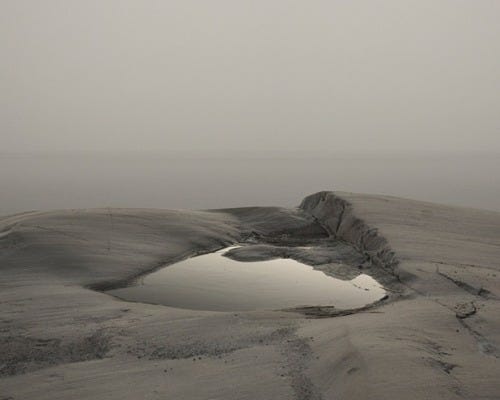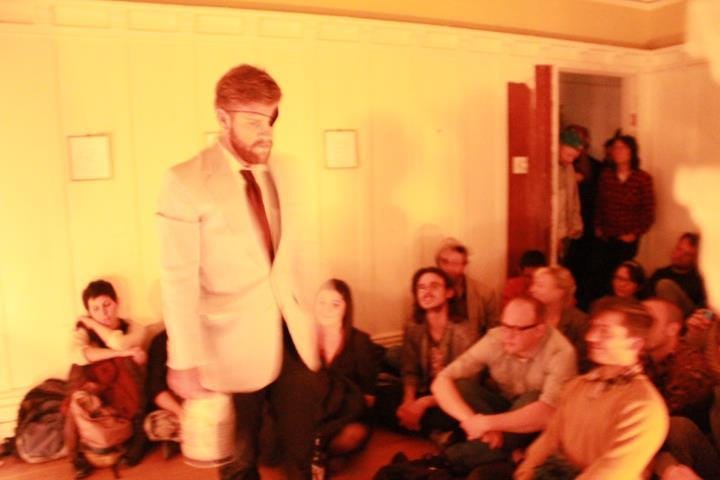NOTHING IS MORE INFECTIOUS THAN THE PASSION FOR COLLAPSE
Nick Land, Georges Bataille, & Intoxication in the Tenderloin at 4am.
My copy of Nick Land’s The Thirst for Annihilation: Georges Bataille and Virulent Nihilism bears a heavy mark of staining on the top right edge. The physicality of the book, the mark that it carries upon its surface, is a specific reminder of an event, an almost humorous elaboration of Bataillean excess. Putting theory into practice.
While I have always been dedicated to research, most of my 20s were spent indulging in a sort of non-utilitarian excess that is at direct odds with most of my current practice. Which is to say, I participated in the effusion of intoxication with regularity. Critically, I could perhaps just describe my role in the world as a functional alcoholic.
The night in question, which left the physical mark upon my copy of Nick Land’s thesis -turned-monograph, occurred while I lived in San Francisco.
At the time I was living very tightly, paycheck to paycheck. I was sharing a room with a coworker in a neighborhood of SF that I had never visited before I moved in. It was in the space of the first year I lived on the West Coast, a year in which I called 14 different places “home” over the course of 11 months. Sublets, couches, very short leases, the kindness of others. Because of this truly nomadic lifestyle, I wasn’t lugging very many belongings around: most of my books were in storage in my parents’ basement halfway across the country.
But I did have a copy of The Thirst for Annihilation. I had read a library copy a few years before, but encoutnered an urgent need to revisit. I had spent the first six months of my time in California enraptured within Stuart Kendall’s translation/assemblance of Bataille’s The Unfinished System of Non-Knowledge, and the cosmic pulse of The Congested Planet forced me to want to reconcile with Land’s chapter The Curse of the Sun.
The night in question found the following objects in my backpack: apartment keys, my notebook, a copy of Land’s book, and a 1.75L bottle of Early Times whiskey. The whiskey had been purchased out of what I would have, at the time, called necessity because I had a mere $30 in my checking account, but wanted to still enjoy a night of excess hanging out at a gay bar in SF’s Tenderloin district, I had to figure out how I could spend all night drinking without having to pay the cost of bar drinks. There was a weekly party that I never missed, a sort of proto-explosion of what I read as becoming the queer hyperpop scene ~10 years later; a party called High Fantasy. I knew my bag wouldn’t get checked upon entering the party, so I had planned to just order soda waters all night, tipping with my remaining cash, and going to the bathroom with my backpack to surreptisiously make my drink of choice; the whiskey-soda.
I was successful in this endeavor, but as I am not a person given to moderation there came a point where I just started swigging (read: chugging) from the bottle. The club closed at 2am and I found myself following a group of people I barely knew to a park near the Haight. I kept drinking. I have no idea what happened over the space of the next few hours.
Somewhere around 4am I regained consciousness, walking in circles around a tennis court. A perverse echo of the Whirling Dervish. My clothes were soaking wet. I was, of course, drunk, but a shock of conciousness made me realize I needed to take some sort of action. I had my wallet and my nearly-dead phone in my pockets, but had no idea where my backpack was. I have the possibly imagined memory of frantically calling a friend that I knew lived nearby, but when I made it to what I thought was his apartment, no one answered the door. I walked to a street where I had a vague idea of the bus route, hoping that I wasn’t too late. I caught the bus, discovering it was the last ride of the bus’s schedule. What I didn’t realize is that I got on the bus in the wrong direction.
Time passed. I felt miserable, but I almost always felt miserable in those days. San Francisco is not a huge city, but to walk from one side to another is impossibly complicated, especially when you’re “post-drunk” at 5am. I was truly exhausted.
I managed to make my way downtown and find the 24 hour Burger King. I spent the last $4 in my checking account on garbage food. The BART had long stopped running, and, having just recently moved to the place where I was crashing, I had absolutely no idea of how to get to where I needed to go without access to BART. By this point, of course, my phone was dead.
There is a sort of intellectual despair that is only accessible in the space between still being drunk and the killer-hangover of a seasoned drinker that tunnels into a nearly apocalyptic, blank-minded sense of annihilation. The only world around me was junkies and vagrants, and I was eating a hashbrown in a 24-hour Burger King at 5am, alone.
It is more difficult! In other words, I arrive at the sovereign operation, wherein thought accepts no subordinate object and losing itself in a sovereign object, annihilates the demand for thought within itself. (Georges Bataille, Method of Meditation)
This sort of situation cannot be considered, in the moment, with any sort of acuity: one becomes almost autonomous. There’s a sense of freedom in a sort of negative way; a freedom from any expectation, only a sort of escape into the banality of pushing forward. This is not the same sort of adrenaline one gets in a life or death situation that is physically demanding; this feels almost like melting into a puddle. Bataille’s water in water, perhaps, but the sort of negentropic end-point of that line of thought. Is this what it means to lose your ego? Is this why the Tuxedomoon chorus echoes forever when I’m walking through the TL late into the evening? No tears for the creatures of the night. A chasm between empathy and existence opens up. Nothing else becomes important; anything beyond moving forward is window dressing.
When you get down to it, this is how one becomes purely utilitarian in the world. There is no inherent progress or equity in the natural state of existence. Nature abhors a vacuum. Even the concept of survival of the fittest becomes too anthropocentric. Human betterment is not progress in these terms; it’s an unnecessary extra. This is where any health & wellness complex that advocates for “functional” movement or “bio-hacking for peak functionality” is a ruse. With God dead there is no function; deep down we’re just grubs blindly tunneling through dirt.
Eventually I made it to the place where I was staying, banging on the door until someone let me in. I muttered a brief explanation and, blissfully, fell asleep. The next day, thanks to my name and phone-number being listed in my notebook, I received a call. My backpack, my keys, my notebook & my copy of Nick Land’s The Thirst for Annihilation were returned to me. The whiskey was not.
When I first transitioned into, for want of a better term, being fixated with “fitness,” I would always describe that I “did absolutely nothing with my body” throughout my 20s. What’s funny to me, retrospectively, is how resolutely untrue this is. Drunkenness, intoxication, especially considered as one of Bataille’s “apparently sovereign behaviors” is entirely dependent upon the body itself. The corporeality of drunken debauchery is what intoxication is. Poisoning the self on purpose. This requires a body.
I do not miss my constant need for intoxication, this sort of self-negating impulse, but I can recognize now that it was a desperate attempt to access the body that I felt so out of touch with. I craved a physical aporia, the opportunity to, maybe, find the body elsewhere.
Whenever I end up recounting any sort of narrative event from this period of my life I feel a bit silly, perhaps, at the insistence that any of it is important. I think that’s the thing though; it’s not important, but I can recognize and read the narrative situation in hindsight; if I cannot literally learn something from it, I can at least articulate something that I’ve already known. And this becomes helpful.






